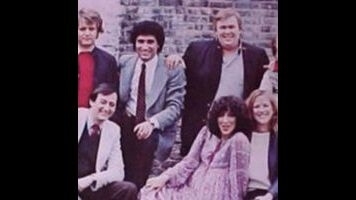SCTV: "One on the Town"

A few months back I spent a woozy week on my couch recovering from a nasty cold. As is often the case when I'm feeling sickly or low, I sought the comfort of the soothingly familiar. So I started re-watching my SCTV DVDs. In my incapacitated state I fell in love with the show all over again. Revisiting the likes of Bobby Bitman, Sammy Maudlin, Jerry Todd and Johnny Larue was like reconnecting with old friends I hadn't seen in a while. Much more so than Saturday Night Live, its American cousin and closest contemporary, SCTV has a beguiling, almost jazz-like rhythm that's infectious. Once you lock into that SCTV groove it's hard to leave it, so I found myself watching episode after episode after episode.
Today I begin covering the legendary Canadian sketch comedy classic for TV Club Classic. I'm starting with the first volume released on DVD, SCTV Network 90: Volume 1 though the show didn't really hit its stride until much later. Looking over an episode guide for the season I'm reminded why I was a little apprehensive about starting here: the season is chockablock with reruns of old sketches and recycled bits. The first episode is essentially little more than old sketches from the show's pre-NBC days with a few new wraparound bits for connective tissues. In this respect the show was both leading with its best foot forward–hitting unsuspecting audiences with some of the funniest bits from its half-hour days–and half-assing it with a bunch of reruns and old material.
One of the new bits is the opening credits and its marathon narration, a brilliant piece of comic misdirection that offers a tongue-in-cheek account of the show's strange evolution. Over footage of the cast and crew in their natural environment, Dave Thomas purrs the following bit of backstory:
There once were seven people who started their own network. But every network has its day, and theirs was over. Or so they thought. They were sick of doing comedy, but not that sick. They were summoned – from their part-time jobs; from their vocations; yes, even from their lifestyles. They were summoned by a force that none of them were able to resist. They were sent to New York City, the entertainment capital of the world, and showered with adulation and attention. They were given the red carpet treatment and ushered into the highest executive offices. They were given contracts to put SCTV back in business. But, abruptly, they were told to get the hell out of New York. The Big Apple just doesn't cotton to hicks. Here's your bus boys. Yes, it was bye, bye Big Apple, hello SCTV. Yes, SCTV is on the air!"
How fucking genius is that? It sets up an archetypal Canucks-let-loose-in-the-Big-Apple paradigm only to yank it away at the last minute and assure us that SCTV would not betray its Canadian roots. A classic bit of physical comedy follows with cantankerous station owner Guy Callabero–who uses a wheelchair not due to any physical disability but rather "for respect"–sliding down a wheelchair ramp, then careening out of control and landing with a thud. Callabero regains composure and introduces what he euphemistically refers to as "golden classics" (i.e–repeats).
SCTV was wildly influential. By "wildly influential I mean "everyone ripped them off". This is especially true of the episode's first "golden classic", "High-Q". It's a parody of high school quiz shows and Jeopardy with Eugene Levy as quizmaster "Alex Trebel" (you can probably guess who that character is based on). Levy begins the sketch calm and composed but as the clueless contestants deliver one mind-bogglingly wrong answer after another he engages in an epic slow burn from sedate to violently apoplectic. Sound familiar? That's probably because that's also the premise of every Will Ferrell Jeopardy sketch ever. In an even more uncanny coincidence just yesterday I watched a SCTV sketch where Levy's hack comedian Bobby Bitman–a proto Krusty The Klown figure in every sense–ruins an episode of the Sammy Maudlin Show by announcing very dramatically that the Falkland Islands had just been invaded. For some reason, this shakes him to the bone: it's the JFK assassination, 9/11 and that Kevin Federline album all wrapped up into one soul-crushing catastrophe. I don't have to remind most of you that The Simpsons had Krusty do the same very weird, very specific gag years later. I'm not saying The Simpsons ripped off SCTV but hey, maybe I am.
One of SCTV's most resonant themes is the chummy over-familiarity of show-business, the carefully cultivated sense that everyone on talk or game shows knocks back scotch or does lines of blow as soon as camera stops rolling. That was also the theme of a quick Merv Griffin parody built around Rick Moranis' uncanny Griffin impersonation. Ever the schmoozer, Moranis' Griffin finishes Liberace's jokes, marvels at Loni Anderson's cleavage ("you have fascinating breasts" he leers in a strangely non-threatening manner) and treats Joe Flaherty's Yasser Arafat with the back-slapping instant camaraderie.
In Steve Martin's Born Standing Up the author writes that Moranis' Woody Allen impersonation is so spookily accurate that he makes the real Allen seem downright inauthentic by comparison. Moranis' absolutely genius Allen impersonation takes center stage on the show-capping sketch, Play It Again, Bob, which in my humble opinion is one of the greatest sketches ever. It's a pitch-perfect dual parody of Allen and Bob Hope (his comic hero in both real life and the sketch) that proves that the best spoofery can double as loving homage.
